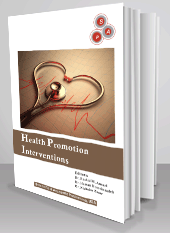Scientific & Academic Publishing
SAP is an open access publisher of journals covering a wide range of academic disciplines.
SAP is an open access publisher of journals covering a wide range of academic disciplines.

Dr. Rashid Ansari received his PhD from Curtin University, Australia and a Master's degree in Public Health with specialization in Health Promotion from the University of Queensland and earned a Master's degree in Clinical Epidemiology from the University of Newcastle. His research work is focused on Health education and promotion and has published many articles in International journals on these topics particulalry addressing the physical activity and dietary interventions among the middle-aged population and applied various health promotion interventions to overcome the problem of self-management of type 2 diabetes.
Dr Hassan Hosseinzadeh is a lecturer and researcher in health promotion, health sociology and health behaviour in the School of Public Health and Community Medicine, Faculty of Medicine, University of New South Wales. He has special interests in health behaviour change, chronic disease, sexual health including HIV/AIDS, health literacy and primary care.
Dr. Nick Zwar is Professor of General Practice and Head of Medical and Undergraduate Education within the School of Public Health, UNSW. He has developed a national and international reputation in health services research in primary care on prevention and management of chronic illness with a focus on respiratory and cardiovascular diseases. His research interests include chronic disease management in general practice and primary health care; chronic obstructive pulmonary disease; intervention on risk factors for chronic disease in particular smoking cessation; hypertension; prevention of stroke; health promotion in primary care; travel medicine and quality use of medicines.
Description
This book aimed at applying a wide range of public health education and health promotion interventions addressing the chronic diseases such as Type 2 diabetes and HIV/AIDS, injury prevention and control, smoking cessation, physical activity and dietary interventions at individual and community levels and assesses the effectiveness of these interventions.
The overall approach is on the principles used in conducting a health promotion intervention project, beginning with assessing the needs of communities and individuals, including target population. This book has also included the concepts of health promotion targeting population by using the information from the community specific needs and planned the intervention reflecting the need of the community, implemented and evaluated it with case studies from communities in developed and developing countries…
Table of Contents
Chapter 1: Introduction
Chapter 2: Diabetes Mellitus in Indigenous Australians: Health Education and Promotion approach to Address the Health Inequality
Chapter 3: Socio-ecological approach to Self-management: The Case of Type 2 Diabetes in a Middle-aged Population
Chapter 4: Physical Activity Education and Intervention: Middle-aged Population of Pakistan with Type 2 Diabetes
Chapter 5: Effectiveness of Fenugreek Intervention: Health Promotion Incentives for Lowering Hemoglobin (HbA1c) in Patients with Self-management of Type 2 Diabetes: A Randomized Controlled Trial
Chapter 6: Socio-ecological approach to Self-management of HIV/AIDS: Case Study of a Patient in Pakistan with HIV Virus
Chapter 7: Health Promotion Intervention to Control the Tobacco Epidemic in Eastern-European Country: Evaluation and Implementation Guidelines
Chapter 8: The Causal Model-based Health Promotion Intervention to Maternal Smoking Women in Pregnancy
Chapter 9: Road Traffic Injury in Low Income Countries: Implementation of a Cost-effective Road Safety Intervention
Chapter 10: Evidence-based Intervention and Safety Promotion to Prevent Child Injuries and Violence in Developing Countries
Chapter 11: Evidence-based Health Promotion Intervention: Effect of Zinc Supplementation in the Treatment of Diarrhea in Young Children
ACKNOWLEDGEMENTS